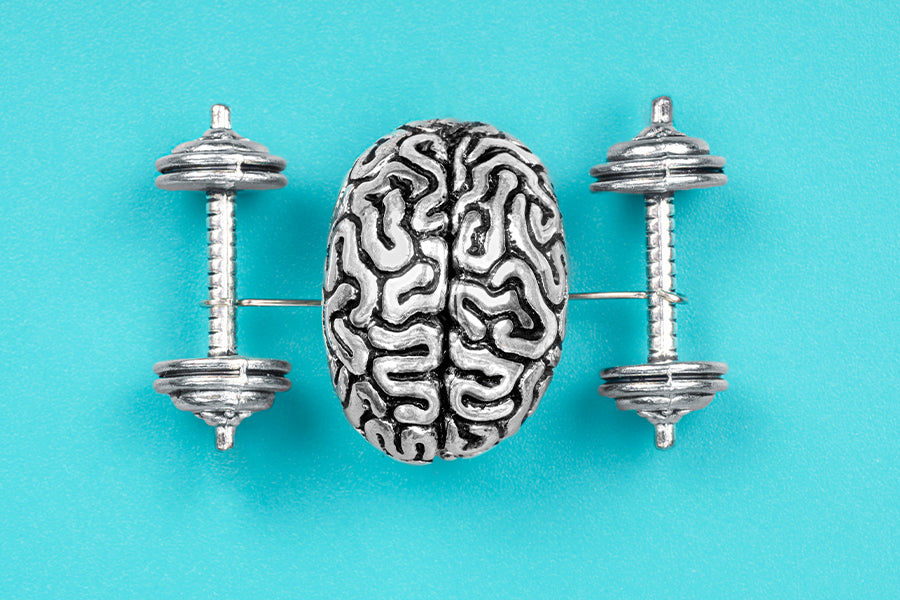Exercise is essential to staying healthy and good for your body and mind. When it comes to staying healthy, exercise has endless benefits. Regular fitness is essential to maintaining our overall well-being, whether physical health benefits such as increased flexibility and strength or mental health advantages like improved moods and lowered stress levels.
But did you know that staying active can also play an essential role in boosting your brain power? That's right - exercising doesn't just give us a leaner body but also helps protect against cognitive decline.
This blog post will look at 8 of the best exercises for improving brain health according to neuroscientists. So if you're keen on reaping maximum rewards from something as simple as physical activity, keep reading!
How Exercise Improves Brain Health
Exercise is a great way to stimulate the mind and boost brain health. When we exercise, it increases levels of neurotransmitters that promote positive mental activities such as learning and keeping up cognitively with tasks.
This increase in neurotransmitters also boosts brain cell structures and helps strengthen memory by improving efficiency on short-term and long-term memory tasks.
Exercise has been linked to increased production of neurons in some regions of the hippocampus, which allows for better functioning abilities that can help improve our cognitive ability to recall new things quickly and accurately.
Lastly, physical activity increases oxygen flow to the brain, which improves blood flow, making it easier for essential nutrients to reach the brain cells; this helps those cells utilize energy faster, which leads to better overall performance while studying or engaging in other mentally taxing activities.
From increased neurotransmitters and nerve cell production to improved oxygen flow and delivery of nutrients, exercise provides numerous benefits that contribute to a healthier overall mental state for an individual. Therefore, there are many different ways that exercise can improve our cognitive functioning and overall brain health!
The 8 Best Exercises for Brain Health
We've compiled a comprehensive guide to the top 8 exercises that significantly affect your overall brain health.
1. Dance Your Heart Out

Dance is a fantastic way to exercise both body and mind. A study conducted by researchers at North Dakota’s Minot State University in 2012 found that the Latin-style dance program, Zumba, helped enhance cognitive skills and boost mood.
Dancing is a dynamic exercise involving coordination between various muscle groups that challenge physical fitness and mental agility.
Physical activity can improve blood flow in the brain which helps with focus and concentration. Dance's coordination and creative elements help build cognitive skills as you focus on just one set of instructions and express yourself through movement.
The movements keep the body active and engaged, while the music helps stimulate cognitive function. Combining physical activity with a creative form of expression helps strengthen neural connections in the brain and increases your ability to learn new things.
Participating in a regular dance class or watching online instructional videos can be beneficial. Alternatively, create your original moves at home with upbeat music playing in the background.
2. Aerobic Exercise

Aerobic exercise is any form of physical activity that requires the body to draw on oxygen to generate energy. Examples of aerobic exercises include running, walking, cycling, and swimming. Regular aerobic exercise has significant physical and mental health benefits.
Research suggests that a higher level of oxygen and other nutrients are delivered to the brain once our heart rate is elevated through aerobic exercise. This influx of oxygen helps increase overall alertness and concentration, making us better able to focus on the tasks at hand.
Engaging in aerobics has also been linked to improved memory, allowing for better recall of previously learned material. The brain can better cope with various cognitive tasks when it receives more oxygen-rich blood.
With regular aerobic exercise, your brain's capability for problem-solving, decision-making, and memory can all be enriched, thus leading to good brain health.
Related Article: The Best Aerobic Steppers to Buy
3. Weight Training

Engaging in weight training exercises can improve your overall brain health. When you're lifting weights, your body is acting as a resistance for the exercise. This resistance directly stimulates blood flow to the brain, leading to healthier and more efficient brain functioning long-term.
Weight training also increases endorphins, which are known to stimulate brain function. Endorphins also reduce anxiety and stress levels and add a sense of well-being that can have an overall beneficial effect on cognitive health.
Additionally, challenging various muscles within your body during weight training exercises can help create new brain cells and pathways that will benefit cognitive functions.
Regular strength exercises encourage a greater balance between body and mind–all working together to form a healthier whole. Ultimately, a combination of these benefits makes weight training vital for physical and cognitive health too!
4. Yoga

Yoga is a form of exercise that has been practised for centuries and has recently become increasingly popular. While it is well known for its physical and mental benefits, it may also benefit brain health.
Regular yoga practice increases blood flow to the brain, which helps keep your brain healthy. It can improve cognitive processes such as concentration, focus, short-term and long-term memory, and critical thinking.
Furthermore, Yoga has been known to reduce stress levels and depression, directly impacting your brain's health. Research suggests that yoga provides numerous physical and cognitive advantages by improving overall mental well-being while positively impacting other bodily functions, such as cardiovascular health.
All these mental health improvements indicate how valuable yoga can be for protecting your overall brain health.
Related Article: 6 Yoga & Exercise Poses to Warm Up Your Body Before Deadlifts
5. Tai Chi

Tai Chi is an ancient Chinese martial art form known for its slow, graceful movements and meditation benefits. It is a mind-body exercise consisting of slow, continuous movements that promote relaxation, improve balance and flexibility, and positively affect overall health.
Studies have found that the practice can improve brain health as well. In particular, research has shown that Tai Chi can help increase cognitive capacity, focus, and alertness and reduce mental distress levels. It also increases oxygen flow to the brain and enhances blood circulation; both contribute to faster cognitive processes and improved mental clarity.
By promoting relaxation, balance, and increased blood circulation to the brain, Tai Chi is an effective exercise to strengthen your mental capacities.
6. Stretching

Stretching is a simple yet effective exercise with more benefits than is often seen on the surface. Research has found that stretching can improve brain health, as well. Stretching increases blood flow to the muscles and organs, including the brain, which in turn allows for improved delivery of oxygen and other nutrients essential for the proper functioning of the body.
It also reduces inflammation, regulates stress-induced hormones such as cortisol, improves focus and overall thinking skills by reducing mental tension, and can even help improve memory due to its impact on alertness.
The combination of physical movements involved in stretching can help rearrange pathways in the brain, which create neural connections that benefit cognitive functions such as learning processes. All these factors demonstrate how stretching can improve our brain health in numerous ways.
7. Interval Training

Interval training is an effective workout technique that focuses on alternating high-intensity bursts of exercise with shorter periods of rest or low-intensity activities.
Interval training has been proven to have significant health benefits, including improved brain functioning. Studies suggest interval training can increase cognitive performance, boost alertness and concentration, and enhance memory recall and creativity.
It works by raising the heart rate and then allowing it to come back down in short intervals throughout the session. All this leads to better mental clarity and higher activity levels in the brain's frontal lobe, helping you reach peak mental performance and keep stress levels in check.
8. Cardio

Cardio exercises provide various physical and mental health benefits and can improve brain health. Cardio improves blood flow to the brain. The increased blood flow that comes with cardiovascular activity helps deliver more oxygen to the brain, which supports vital functions like thinking skills, decision-making, problem-solving, and more.
Additionally, cardio exercise boosts the production of helpful hormones such as endorphins, which positively affect mental state and mood by providing relief from anxiety and stress while improving the overall outlook on life.
These different elements provided by cardiovascular activities combine to make it an excellent choice for those looking to keep their brains healthy and sharp.
The Bottom Line
Exercise isn't just good for your heart and muscles but also wonders for your brain. Neuroscientists have found that the best exercises to improve brain health challenge you mentally and physically. The next time you're looking for a workout, consider one of these eight exercises that neuroscientists suggest best for improving brain health. From aerobics to weightlifting, the exercises on this list will fit everyone's fitness level and interests. And the best part is you don't have to spend hours at the gym to see benefits – even moderate exercise may help improve cognitive function.
Reading List
Article Sources
- Abbott, Ryan, and Helen Lavretsky. “Tai Chi and Qigong for the Treatment and Prevention of Mental Disorders.” The Psychiatric Clinics of North America, vol. 36, no. 1, Mar. 2013, pp. 109–19. PubMed Central, https://doi.org/10.1016/j.psc.2013.01.011.
- Anderson, Elizabeth, and Geetha Shivakumar. “Effects of Exercise and Physical Activity on Anxiety.” Frontiers in Psychiatry, vol. 4, Apr. 2013, p. 27. PubMed Central, https://doi.org/10.3389/fpsyt.2013.00027.
- Büssing, Arndt, et al. “Effects of Yoga on Mental and Physical Health: A Short Summary of Reviews.” Evidence-Based Complementary and Alternative Medicine : ECAM, vol. 2012, 2012, p. 165410. PubMed Central, https://doi.org/10.1155/2012/165410.
- Luettgen, Mary, et al. “Zumba®: Is the ‘Fitness-Party’ a Good Workout?” Journal of Sports Science & Medicine, vol. 11, no. 2, June 2012, pp. 357–58. PubMed Central, https://www.ncbi.nlm.nih.gov/pmc/articles/PMC3737860/.
- Mekari, Said, et al. “High-Intensity Interval Training Improves Cognitive Flexibility in Older Adults.” Brain Sciences, vol. 10, no. 11, Oct. 2020, p. 796. PubMed Central, https://doi.org/10.3390/brainsci10110796.
- Nystoriak, Matthew A., and Aruni Bhatnagar. “Cardiovascular Effects and Benefits of Exercise.” Frontiers in Cardiovascular Medicine, vol. 5, Sept. 2018, p. 135. PubMed Central, https://doi.org/10.3389/fcvm.2018.00135.
- Sudo, Mizuki, and Soichi Ando. “Effects of Acute Stretching on Cognitive Function and Mood States of Physically Inactive Young Adults.” Perceptual and Motor Skills, vol. 127, no. 1, Feb. 2020, pp. 142–53. DOI.org (Crossref), https://doi.org/10.1177/0031512519888304.











